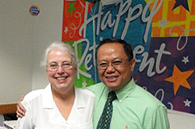Maintaining Your Membership
(This article appeared in the September/October 2006 issue of The American Postal Worker magazine.)
Doug Holbrook, Director
We receive requests every day asking how those about to retire can continue their membership in the union. The following are summaries of the constitutional requirements for maintaining status as a member of the APWU.
‘Full’ Membership
An APWU member who retires from Postal Service employment in a position covered by the Collective Bargaining Agreement may maintain full union membership by continuing to pay full per capita taxes, along with the required local dues. (The dues are paid at the local level; having no paycheck, the retiree necessarily is a “cash-pay” member.)
Such retirees retain all rights as members, including the right to participate in elections: Their ballot will come from whatever division they last served while on active duty.
‘National’ Membership
A bargaining-unit member who retires from Postal Service employment may become an APWU retiree through an alternate route known as “full national membership.”
Such retirees choose to maintain membership with the national APWU only, and pay full national per capita taxes to the APWU, plus $24 annually to the APWU Retirees Department. These union members maintain full voting rights in the national officers election held every three years (the next election is in 2007). Retirees who go this direction have their dues deducted from their monthly annuity checks.
(Retirees may also choose to simply become members of the APWU Retirees Department and pay just the $24 per year per capita tax to the national union. Such retirees elect the Retirees Department director and the five delegates to the national convention. The department’s director and convention delegates each have a voice and one vote at the biennial convention.)
The Five-Stage Retirement
America ’s Baby Boomers — commonly defined as those born from 1946 to 1964 — are facing very long retirements, in fact, the longest that any generation has had to look forward to: There is a 45-percent chance that a couple with an average age of 65 will have one party see a 95th birthday!
Because retirees are living so much longer, they have opportunities to “redefine themselves,” which has led demographers to distinguish five stages of retirement.
The first stage begins 15 years before the actual retirement. During the “imagination” phase, many start fantasizing about what retirement will be like, with studies showing that 65 percent have high expectations of adventure.
The “anticipation” phase kicks in about five years before retirement. At this stage, about 80 percent say that they are very optimistic about what the future holds.
The third stage is known as “liberation” and begins with actual retirement. Initially, it’s a time of great enjoyment, but it lasts only about a year, and so is also known as the “honeymoon phase” of retirement. “Though they admit they miss their friends and social connections from work,” a Harris Interactive survey conducted last summer reports, “people in this stage are fully engaged in everything their new freedom has to offer: Reconnecting with spouses and families, hobbies, traveling, even starting new businesses.”
After a year, the euphoria tends to fade as reality sets in. This is when the fourth stage, “reorientation,” begins. During this phase, which last between two and 15 years, optimism tends to slacken, and the proportion of people who say they are enjoying retirement begins to diminish.
Finally, in the fifth stage, “reconciliation,” retirees come to terms with their post-career lives. “This stage is marked by increased contentment and acceptance of the reality of retirement,” the Harris study says. Survey participants by and large are “positive about retirement; 65 percent report that they are living their retirement dream, and 75 percent are enjoying it a ‘great deal.’”
These are very interesting data, but I sincerely hope that more than three-quarters of our members are “greatly enjoying” their retirement. We know one way that can help increase enjoyment, and that would be to join the APWU Retirees Department.



